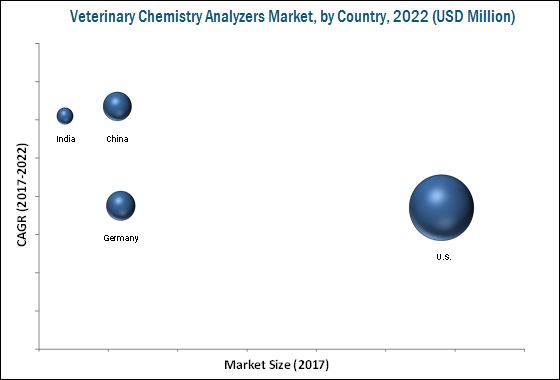The Factors such as increase in animal population, growing pet adoption, rising demand for animal-derived food products, increasing incidence of zoonotic diseases, growing demand for pet insurance, rising animal health expenditure, and growth in the number of veterinary practitioners and their income levels in developed economies are driving the growth of the global veterinary chemistry analyzers market. However, increasing pet care costs may hinder the growth of this market to a certain extent.
Expected Revenue Surge: The Global Veterinary Chemistry Analyzer Market is estimated to grow at a CAGR of 8.7%, to reach USD 1,205.2 Million.
Research Methodology;
Top-down and bottom-up approaches were used to validate the size of the global veterinary chemistry analyzer market and estimate the size of various other dependent sub-markets. This study estimates the market size and projects its demand till 2022. The major players in the market were identified through secondary research and their market revenues were determined through primary and secondary research.
Secondary research included the study of the annual and financial reports of the top market players, whereas primary research included extensive interviews with the key opinion leaders such as CEOs, directors, and marketing executives. The percentage splits, shares, and breakdowns of the product markets were determined using secondary sources and verified through primary sources. All possible parameters that affect the market covered in this research study have been accounted for, viewed in extensive detail, verified through primary research, and analyzed to get the final quantitative and qualitative data.
Request Research Sample Pages:
https://www.marketsandmarkets.com/requestsampleNew.asp?id=48798056
Market Segmentation in Detailed:
Basis on Product;
this market is segmented into instruments and consumables (panels, kits, test strips, and reagents). In 2016, the consumables segment accounted for the largest share of the global veterinary chemistry analyzer market. It is expected to register the highest growth during the forecast period. The high growth of this segment is mainly attributed to the increased adoption of the pre-loaded multiple reagent panels and pre-loaded single slide reagent panels by the end users.
Basis on Applications;
the market is categorized into blood chemistry analysis, urinalysis, glucose monitoring, and blood gas-electrolyte analysis. The blood chemistry analysis segment accounted for the largest share in 2016, while the glucose-monitoring segment is expected to witness the highest growth during the forecast period. The veterinary chemistry analyzer market is further segmented, on the basis of animal type, into companion animals and livestock. In 2016, the companion animal segment accounted for the largest share of the market. This segment is also expected to register the highest growth during the forecast period.
Download PDF Brochure:
https://www.marketsandmarkets.com/pdfdownloadNew.asp?id=48798056
Geographically; The global veterinary chemistry analyzers market is segmented into developed markets and emerging markets. The developed markets comprise the U.S., Canada, Germany, the U.K., France, Italy, Spain, and Japan. This developed markets accounted for the largest share of the global market.
However, the emerging markets (including China, India and Latin America) segment is expected to witness the highest growth rate during the forecast period. Growth in the emerging markets can be attributed to the rising animal population, growing pet adoption, increase in the demand for animal-derived food products, growing per capita animal health expenditure (especially in India, Latin America, and China), and rising awareness regarding animal health and welfare. Among the developed and emerging markets, the U.S. accounted for the largest share of global veterinary chemistry analyzer market.
Some of the prominent players in this market are IDEXX Laboratories, Inc. (U.S.), Abaxis, Inc. (U.S.), Heska Corporation (U.S.), Randox Laboratories Ltd. (U.K.), ARKRAY, Inc. (Japan), Eurolyser Diagnostica GmbH (Austria), Alfa Wassermann Inc. (U.S.), DiaSys Diagnostic Systems, USA, LLC (U.S.), Diconex SA (Argentina), Chengdu Seamaty Technology Co., Ltd.(China), Biochemical Systems International Srl (Italy), ELITechGroup (France), and URIT Medical Electronic Group Co. Ltd (China).



